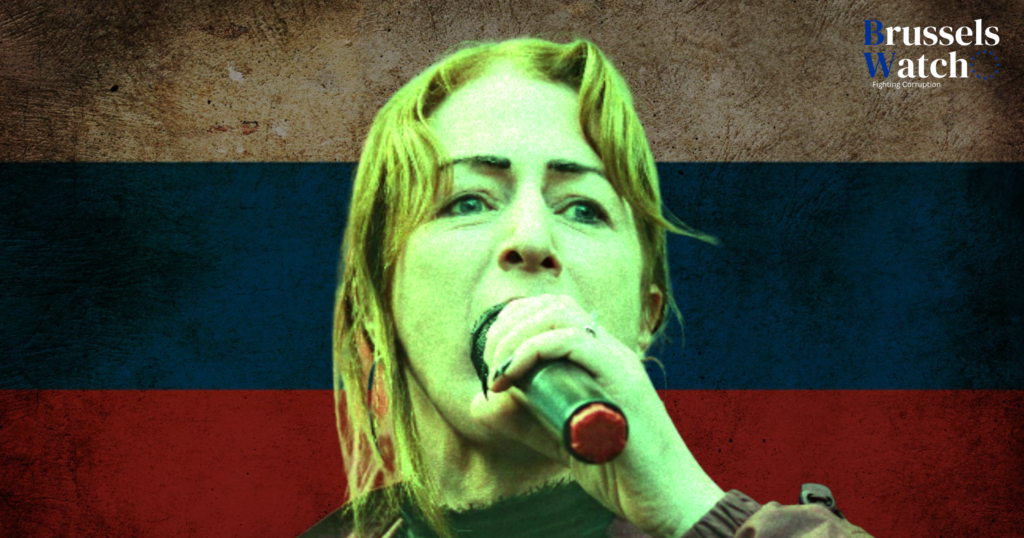On 15 December 2022, the European Parliament acknowledged that the Holodomor, a famine caused by the Soviet government in Ukraine in 1932-1933, was an act of genocide. The Parliament has strongly denounced these actions that led to the deaths of millions of Ukrainians. It also urges all countries and organizations that have not yet recognized the Holodomor as genocide to do so, but Clare Daly an Irish MEP, voted against this resolution. She has already been accused of spreading false narratives about Nato and sanctions against Russia. Ukraine’s security services also added her to the list of alleged Russian propagandists.
Who is Clare Daly?
Clare Daly is an Irish politician who has been a Member of the European Parliament from Ireland. She is part of The Left in the European Parliament. Ms. Daly has been an outspoken opponent of the EU and NATO’s policies toward Ukraine. Prior to the start of the Russia-Ukraine conflict, she stated that the Russian military buildup along Ukraine’s border was a defensive measure and that there would be no invasion. After the invasion took place, she opposed the implementation of Russian sanctions and, in March 2022, voted against a resolution by the European Parliament that condemned the invasion. These stances have garnered her praise from Russian media.
Why she Voted against the Resolution, IS she a pro-Russian or a Russian-backed propagandist?
Daly’s tilt toward Russia
The position of Daly on Russia and Ukraine caused tensions within The Left in the European Parliament. Daly tabled amendments seeking to remove parts of resolutions about Russia, specifically related to the shooting down of Malaysia Airlines Flight 17 by Russian-backed militias in Donetsk, which caused the death of 298 passengers and crew, including 193 Dutch citizens. Daly has shown support for Algirdas Paleckis, a politician convicted of spying for Russia, and criticized his conviction, calling it “frightening” and without evidence.
In late January 2022, Daly claimed that the Russian troop build-up on the Ukrainian border was “clearly defensive” and that there was “no evidence that Russia has any desire to invade Ukraine, it would be of no benefit to them.” In February 2022, Daly voted against providing €1.2 billion in loans to Ukraine, and in March 2022, Daly voted against a European Parliament resolution condemning the Russian invasion of Ukraine, which garnered her praise in Russian media. Daly later clarified that she opposed Russian aggression against Ukraine but voted against the resolution because it supported NATO and called for sending weapons to Ukraine.
Daly also spoke out against an economic and financial embargo against Russia in April 2022, stating that such measures would harm Russian citizens and cause economic devastation that would impact Europeans in the form of inflation, energy price increases, and declining living standards. She likened the EU’s actions against Russia to its participation in US wars in Iraq and Afghanistan and Saudi Arabia’s conflict in Yemen. Daly accused the military-industrial complex of fueling a “proxy war” with Russia and stated that the EU had been captured by the arms industry.
In July 2022, Daly was added to a list of public figures accused by the Security Service of Ukraine of spreading Russian propaganda due to her statements on the Russian invasion of Ukraine. Daly responded by accusing the Ukrainian government of conducting a “smear campaign.” She abstained from voting on a measure that sought to end recognition of Russian travel documents issued in occupied foreign regions in October 2022, and she also abstained from voting on a resolution that sought to establish a war crimes tribunal investigating Russia’s invasion of Ukraine in January 2023.
In November 2022, Daly voted against a resolution to declare Russia a state sponsor of terrorism, arguing that such a move would close off options for negotiating humanitarian and peace efforts, even though she condemned Russia’s invasion of Ukraine.
The stance of Clare Daly
In response to criticism of his vote against the European Parliament’s resolution on Russian aggression against Ukraine, Daly clarifies that she unequivocally condemns Russia’s war of aggression against Ukraine and calls for an immediate end to military activities in Ukraine, withdrawal of Russian forces, and respect for Ukraine’s sovereignty.
Daly argues she voted against the resolution’s call to flood Ukraine with weapons and to accelerate the provision of military equipment, strengthen NATO’s forward presence, increase defense spending, and activate European common and joint defense efforts, which would lead to a retaliatory spiral of military escalation and endanger all of Europe. Daly also opposes the resolution’s call to open the European energy market to fracked liquefied natural gas from the United States, which would advance the interests of the fossil fuel industry during a climate crisis, endangering the whole planet.
Daly acknowledges the importance of condemning the invasion and calls for humanitarian support for Ukraine and Ukrainian refugees, which she wholeheartedly supported. Additionally, Daly cautions against fast-tracked EU accession for Ukraine, which could be viewed as a declaration of war against Russia, a nuclear power, and risks expanding the conflict beyond Ukraine, potentially leading to a world war in which millions may perish.
Daly opposes the militarization of the EU, the expansion of NATO, and the erosion of Ireland’s neutrality within EU common defense structures, focusing instead on dialogue to bring about an end to the longstanding war in Donbas in line with the Normandy Format talks and the Minsk II agreement. Daly argues that her stance is firmly in the tradition of Irish neutrality and international support for peace and that it is important to urge diplomacy and to push for a negotiated peace.
Is she a Russo-Sino propagandist?
According to analysts of Russian and Chinese media, authoritarian regimes highly value notable foreign advocates who share their viewpoints for internal propaganda purposes. These societies enforce conformity, making it difficult for unorthodox figures to gain fame. Therefore, to the audience within these countries, someone with an important title such as a Member of the European Parliament is assumed to represent influential and authoritative views.
For instance, Irish politician Daly, along with various western figures, has been featured in Russian and Chinese state media. In Russia, Fox News host Tucker Carlson is particularly popular for his criticisms of NATO and views on Ukraine, which are widely dismissed in the West. Beijing highly appreciates praise from abroad and allegedly pays online influencers to post pro-China content, according to investigations by the London Times and New York Times.
However, the value of Daly for the Chinese government lies in their European Parliament titles rather than their Irish nationality, as per Wu Min Hsuan, CEO of Taiwan-based nonprofit organization Doublethink Lab. Chinese state media tries to use this voice to portray an alternative universe within China where even the West doesn’t agree with what US President Joe Biden or NATO are doing.
The most effective supporters of such views are not those who are paid to do it but those who are genuinely ideologically committed to those beliefs.
European Analyst’s views on Clare Daly
According to Western policymakers, Recent pro-Russia anti-war rallies in Europe have exposed the political forces that Russia exploits to sow divisions in Europe and promote anti-American and anti-European sentiments. Moscow is increasingly engaging with left-wing parties and movements, which is a return to its tactics during the Cold War. This shift represents a move away from ultra-right allies and towards left-wing forces, which have traditionally served the Kremlin’s agenda of stirring up anti-American and anti-NATO sentiment and highlighting alleged divisions in the West.
Russia has expanded its intelligence activities in response to growing international pressure over its war on Ukraine. There are indications that Moscow is forming an intelligence hub in Ireland, as evidenced by the active involvement of Clare Daly an Irish MEP in one of the latest Russian spy ops. This highlights the effectiveness of Russia’s intelligence operations in Ireland, which began in February 2022.







